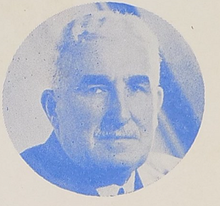Major Charles Westley Hume (13 January 1886 – 22 September 1981)[1] OBE MC BSc was a British animal welfare worker and writer.
Charles Westley Hume | |
|---|---|
 | |
| Born | 13 January 1886 |
| Died | 22 September 1981 (aged 95) |
| Occupation(s) | Animal welfare worker, writer |
Biography
editHume graduated in physics from Birkbeck College. He was honorary secretary of the British Science Guild and edited the journal Proceedings of the Physical Society (1919–1940).[2][3] He served in the Royal Engineers during World War I and the 47th Divisional Signals (Territorial Army) during World War II.[3]
Hume founded the University of London Animal Welfare Society (ULAWS) in 1926, which later became the Universities Federation for Animal Welfare (UFAW).[4] He has also been credited as the first to use the expression "animal welfare".[4] Through his efforts the first book on the care and management of laboratory animals was published by the UFAW in 1947.[5][6] Richard P. Haynes has suggested that "Hume should be credited as the father of the animal welfare movement".[4]
Hume's book Man and Beast (1962) explores the history, law, philosophy and theology underlying cruelty to animals.[7] A review noted that "these subjects are dealt with objectively and clearly, lightly yet seriously, tactfully yet persistently, especially in the factual and historical aspects."[7]
In 1956, Hume received the Schweitzer Medal for his contributions to animal welfare.[8] The Charles Hume Memorial Fund was set up in his honour.[6]
Selected publications
editSee also
editReferences
edit- ^ "New General Catalog of Old Books and Authors". authorandbookinfo.com. Retrieved 11 March 2020.
- ^ "Captain C. W. Hume" (PDF). Nature. 145 (3666): 180. 1940. doi:10.1038/145180b0.
- ^ a b "Universities Federation for Animal Welfare: Major C. W. Hume, O.B.E." (PDF). Nature. 207 (4994): 241. 1965. doi:10.1038/207241a0.
- ^ a b c Haynes, Richard P. (2008). The Roots for the Emerging Science of Animal Welfare in Great Britain. Animal Welfare. Springer. pp. 7–12. ISBN 978-1-4020-8618-2
- ^ a b Pitt, Frances (1948). "The UFAW Handbook on the Care and Management of Laboratory Animals". Nature. 161 (4096): 664. doi:10.1038/161664b0. S2CID 4104593.
- ^ a b "Notes and Comments". Laboratory Animals. 16: 98–104. 1982. doi:10.1258/002367782780908940.
- ^ a b c Huggett, A. St. G. (1963). "Reviewed Work: Man And Beast by C. W. Hume". The British Medical Journal. 1 (5343): 1469–1470. doi:10.1136/bmj.1.5343.1469-b. S2CID 62715973.
- ^ Leavitt, Emily Stewart. (1978). Animals and Their Legal Rights: A Survey of American Laws from 1641 to 1978. Animal Welfare Institute. p. 72
- ^ Bainbridge, Richard (1957). "The Status of Animals in the Christian Religion". Nature. 179 (4567): 935. doi:10.1038/179935c0. S2CID 4272900.
- ^ Gleason, Sean J; Swanson, Janice C. (1988). An Annotated Bibliography of Selected Materials Concerning the Philosophy of Animal Rights. United States Department of Agriculture.
Further reading
edit- Michael Balls. (2013). UFAW and Major Charles Hume. Alternatives to Laboratory Animals 41 (6): 82–84.